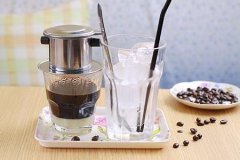Do you know how to treat raw coffee beans?
Washing is the most popular and widely used green bean treatment method, most of the fine coffee beans will choose washing method. In South America, all countries except Brazil choose the washing method for raw beans.
Water washing method is the highest technology content of all processing methods, through multiple screening to ensure uniform and stable quality of fine coffee beans. First, still put the beans into the tank, then remove the floating beans, and put the beans that sink to the bottom of the tank into the pulper. The pulper not only removes the pulp, but more importantly it cleverly uses pressure to completely filter out the immature beans. The beans are then put into a fermentation tank for the most important washing fermentation treatment. The purpose of washing fermentation is to remove pectin from the beans, which takes about 16 to 32 hours to ferment. In the fermentation process will also produce a lot of acidic substances, the appropriate acetic acid can not only make coffee beans less moldy, but also increase the flavor of coffee. But overfermented beans can also be tarnished and turn into poor-quality coffee. The water content of the fine coffee beans of the washing method is generally about 16%. The beans have a good appearance, and the relative miscellaneous taste is less, the taste is clear, and the fruit acid taste is bright.
Solarization is a traditional method of primary processing of coffee beans, and ancient coffee growing countries such as Ethiopia and Yemen still use solarization almost exclusively for raw beans. Sun-drying begins by spreading tank-identified beans, i.e., ripe or semi-ripe beans, on a drying ground for natural drying. The exact time depends on local climatic conditions, and generally takes two weeks to four weeks. When the moisture content of the coffee beans is reduced to 12%, then use a husker to grind off the dried pulp and silver skin. Sunlight treatment is very demanding on the climate. If it rains during the sun, it will make the beans regain moisture and mold.
Sun-dried beans are yellow when raw and brown in the center when baked, rather than white when washed. Sun-baked beans have a relatively better sweetness and body, and less sourness, but the quality is less stable and will have greater fluctuations. Due to the low cost of solarization, it is widely used not only in Ethiopia and Yemen, but also in coffee beans grown in Africa and Indonesia. Miel Process (Spanish for Miel Process) is said to refer to the process of making raw beans with a mucous membrane that is sun-dried. After coffee beans have been stripped of their outer pulp, they have a sticky, gelatinous layer. The traditional washing method is to wash it with clean water, but because of the water resource limitation of some high-altitude habitats, this direct drying method has emerged.
The honey processing process is susceptible to contamination and mildew, requiring close supervision, constant stirring and accelerated drying to avoid undesirable fermentation odors. Its advantage is that it can best preserve the original sweet flavor of coffee ripe fruit, so that coffee presents a light brown sugar flavor and stone fruit sweet, while the berry flavor also supports the red wine base aroma, considered a very elegant product. The honey-treated fine coffee beans are popular, largely due to its sweet and thick characteristics. In recent years, more and more fine coffee beans called "Miel Process" have become the preferred materials of international fine coffee contestants.
Important Notice :
前街咖啡 FrontStreet Coffee has moved to new addredd:
FrontStreet Coffee Address: 315,Donghua East Road,GuangZhou
Tel:020 38364473
- Prev

The classical method of coffee brewing is recommended.
According to the mode of contact between water and coffee powder, coffee cooking is classified into four categories: "steaming", "pressurization", "gravity" and "leaching".
- Next

Types of coffee packaging
Vacuum packaging containers (cans, aluminum foil bags, plastic bags) draw out the air from the container after filling the coffee. Although it is called a vacuum, it actually removes at most 90% of the air, and the surface area of the coffee powder is larger than that of the coffee beans, and even the remaining air can easily combine with the powder to affect the flavor. Gas filling and packaging design a needle on a metal bag
Related
- What is the meaning of lactic acid fermentation with coffee bean treatment?
- How to judge the state of foam by sound?
- How does the latte pull out the unicorn pattern? Come to get for a little trick to improve the flower pull!
- Will flower pulling affect the taste of the latte?
- Do you know the history of coffee?
- The difference between honey treatment and sun washing what is raisin honey treatment?
- What kind of milk can a novice use to make coffee foam to keep the foam longer? The correct method and skills of milking tutorial sharing
- Why do washed coffee beans taste sour? Flavor characteristics of washed Coffee
- Introduction to the skill of how to practice the size and height of water injection around the circle of hand-brewed coffee
- How do beginners practice coffee flower drawing from scratch?

